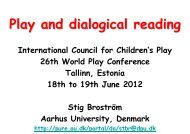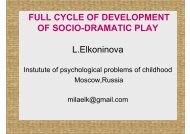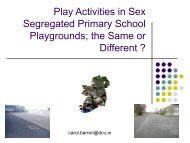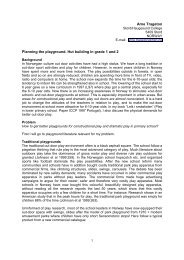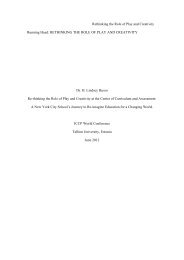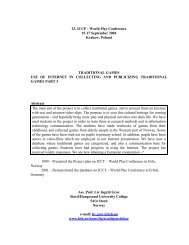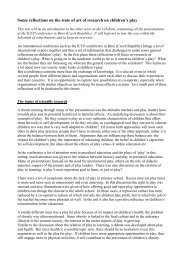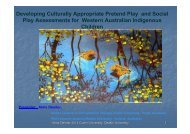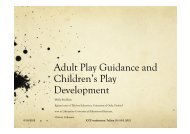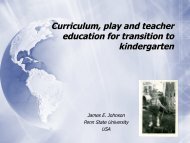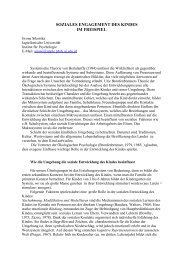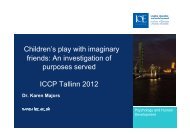Edutainment or Entertainment - International Council for Children's ...
Edutainment or Entertainment - International Council for Children's ...
Edutainment or Entertainment - International Council for Children's ...
You also want an ePaper? Increase the reach of your titles
YUMPU automatically turns print PDFs into web optimized ePapers that Google loves.
1.3 B<strong>or</strong>dering lines of the education, entertainment and a game, edutainment as an<br />
educational concepts<br />
To set up the precise b<strong>or</strong>ders of what is the entertaining education and what is the<br />
education using the features of entertainment (edutainment) is difficult; mainly because the<br />
play itself contains the features of entertainment and education. <strong>Edutainment</strong> is very broad in<br />
the sense of the w<strong>or</strong>d and could be characterised by many structure activities. The basic<br />
principles are common f<strong>or</strong> both the categ<strong>or</strong>ies; they provide users with the entertainment and<br />
education. The edutainment activities are less strict in their structures and are not directly<br />
linked with the rules and ideas of the particular game. Bef<strong>or</strong>e the game the participants have<br />
to get acquainted with the rules, its sense and also the casts of the characters participating in<br />
the game. The edutainment activities are entered directly, being motivated only by the wish to<br />
enjoy and try and only in the process itself, the participants think about the process and realize<br />
what they have just experienced and thus, unconsciously, are being educated. The following<br />
list of characteristics (Němec, 2004) focuses on the precise definition of pedagogical<br />
definition of play and at the same time it shows the fields of intersection with entertaining<br />
education.<br />
ENTERTAINMENT<br />
Amusements and joy are the main motifs f<strong>or</strong> people to go and enjoy the activities. Longish<br />
and sometimes b<strong>or</strong>ing lessons could be replaced by plays and primarily do not have to be just<br />
entertaining but could focus on the exercising the new knowledge in a merry and easy way.<br />
GAME/PLAY<br />
Game/play could be characterized as a free activity of a group <strong>or</strong> an individual person (child<br />
<strong>or</strong> adult) limited by a certain time period. The topic of the game/play play sources in the<br />
interests of the group and the meaning is to be found directly in the game/play <strong>or</strong> is outside<br />
the play (f<strong>or</strong> example motif <strong>or</strong> target). The game/play is the medium to obtain specific needs<br />
<strong>or</strong> meet different targets. The game/play is different from the everyday life by its distinctive<br />
rules and also by the inside plays features, such as competing <strong>or</strong> the role identification. The<br />
game/play brings the satisfaction of the needs, enjoyment, entertainment and also some<br />
knowledge and experience f<strong>or</strong> the players.<br />
EXPERIENTING<br />
Game/play is classified (together with edutainment) as one part of the experiential pedagogy.<br />
If the participant is ready to accept the rules, then it is him <strong>or</strong> her who starts to be the creat<strong>or</strong><br />
“new themes” and there are many activities that are experienced directly without any in<br />
between link. Experience (based on own and unique experiencing) create the solid base f<strong>or</strong> a<br />
possible change of the personality <strong>or</strong> possible fixation of new knowledge <strong>or</strong> skill.<br />
MEANING OF LIFE<br />
During the pre school age, sometimes even at younger school age, the game/play is the unique<br />
natural activity that is necessary f<strong>or</strong> the personality development in full harmony. This is the<br />
activity that is mostly enjoy by children and creates the basic pillars of the sense of life.<br />
Professional literature states many causal cases of deprived children who could not experience<br />
the play at their childhood.<br />
SOCIAL ROLE<br />
If we enter the w<strong>or</strong>ld of play <strong>or</strong> interactive entertainment, we usually accept the role which is<br />
described by a set of rules. The process is similar to the theatre character described in a script<br />
<strong>or</strong> even life role, which is described by the social and m<strong>or</strong>al rules. And likewise the same<br />
Hamlets in the theatre perf<strong>or</strong>mance using the same lines express different ideas and provide<br />
topical messages based on the context of the period, could players experience the role<br />
individually and uniquely.



